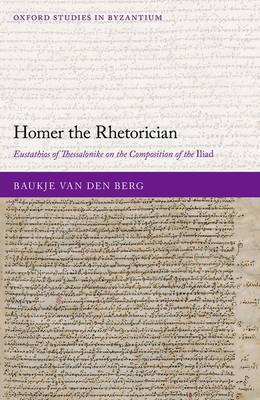
- Afhalen na 1 uur in een winkel met voorraad
- Gratis thuislevering in België vanaf € 30
- Ruim aanbod met 7 miljoen producten
- Afhalen na 1 uur in een winkel met voorraad
- Gratis thuislevering in België vanaf € 30
- Ruim aanbod met 7 miljoen producten
Zoeken
Homer the Rhetorician
Eustathios of Thessalonike on the Composition of the Iliad
Baukje Van Den Berg
€ 177,45
+ 354 punten
Omschrijving
Homer the Rhetorician is the first monograph study devoted to the monumental Commentary on the Iliad by Eustathios of Thessalonike, one of the most renowned orators and teachers of the Byzantine twelfth century. Homeric poetry was a fixture in the Byzantine educational curriculum and enjoyed special popularity under the Komnenian emperors. For Eustathios, Homer was the supreme paradigm of eloquence and wisdom. Writing for an audience of aspiring or practising prose writers, he explains in his commentary what it is that makes Homer's composition so successful in rhetorical terms. This study explores the exemplary qualities that Eustathios recognizes in the poet as author and the Iliad as rhetorical masterpiece. In this way, it advances our understanding of the rhetorical thought of a leading intellectual and the role of a cultural authority as respected as Homer in one of the most fertile periods in Byzantine literary history.
Specificaties
Betrokkenen
- Auteur(s):
- Uitgeverij:
Inhoud
- Aantal bladzijden:
- 280
- Taal:
- Engels
- Reeks:
Eigenschappen
- Productcode (EAN):
- 9780192865434
- Verschijningsdatum:
- 7/10/2022
- Uitvoering:
- Hardcover
- Formaat:
- Genaaid
- Afmetingen:
- 162 mm x 239 mm
- Gewicht:
- 566 g

Alleen bij Standaard Boekhandel
+ 354 punten op je klantenkaart van Standaard Boekhandel
Beoordelingen
We publiceren alleen reviews die voldoen aan de voorwaarden voor reviews. Bekijk onze voorwaarden voor reviews.











